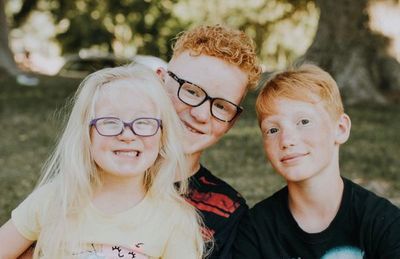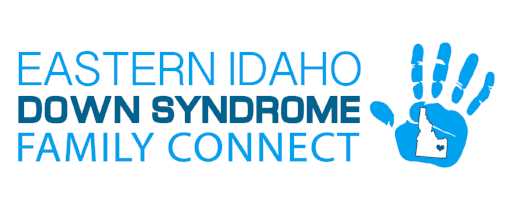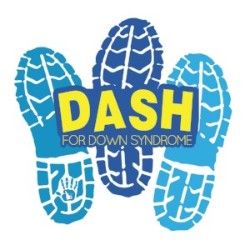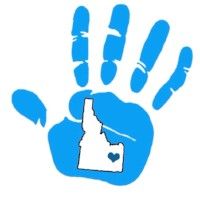New Parents
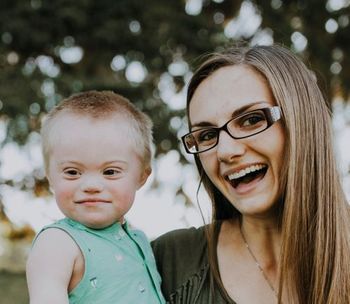
Congratulations on your new baby. While we want to congratulate you, we also realize you are probably experiencing a lot of emotions right now. The first thing we want you to know is that you are not alone. We are here for you. Receiving a diagnosis of Down syndrome for your baby can be a very stressful and overwhelming time. There can be so many thoughts and fears running through your head. Things are uncertain about your baby's future, which leads to worry and concern. However, find comfort in knowing that only your baby will determine what his/her strengths and limitations will be in life. Each person with Down syndrome is an individual and can reach great potential. There will be challenges along the way, but through therapies, medical care, support, and encouragement people with Down syndrome can live happy and fulfilling lives.
We have families that have been in your shoes who are ready to support you. Call 208-716-6504 to be connected with a mom or dad from Eastern Idaho, through our First Call Program, that can relate to your feelings and help you process what you are going through.
Below is a description of Down syndrome, some national resources , and service we provide. We have a lot of information to share so if you have any questions please call 208-716-6504, email info@easternidahodownsyndrome.org, or click here and send us a message. We are here for you.
Description of Down Syndrome
Down syndrome occurs when an individual has a full or partial extra copy of the 21st chromosome. Typically, a person has 46 chromosomes in the nucleus (center) of each cell in his/her body. With Down syndrome a person has 47 chromosomes in the nucleus of each or some of his/her cells. In the United States, approximately one in every 700 children is born with Down syndrome.
Due to the extra 21st chromosome, each person with Down syndrome can have varying health, learning, and physical differences. Some of the most common medical issues with Down syndrome are heart, vision, intestinal, thyroid, and ear, nose, and throat issues. Down syndrome can cause low muscle tone which can make fine motor, gross motor, and speech more difficult. However, with therapy and diligent medical care, many of these issues can be resolved or significantly improved.
People often have misconceptions about Down syndrome from stereotypes in the past. However, we are happy to inform you that babies, children, and adults with Down syndrome are able to live fulfilling and meaningful lives. Current medical advancements and therapy opportunities have left the sky as the limit for individuals with Down syndrome. People with Down syndrome can walk, talk, go to school, work, vacation, and enjoy many other parts of life. People with Down syndrome write their own stories and can live inclusively in their communities.
Down syndrome starts at conception and nothing the mom or dad did or did not do causes Down syndrome.
There are three types of Down syndrome: trisomy 21, translocation, and mosaicism.
The first type, trisomy 21 is the most common type with 95% of people with Down syndrome having this type. This means that every cell in the person's body has an extra 21st chromosome. This type is not inherited, it is sporadic and happens by chance just as if someone won the lottery.
The second type is translocation. This accounts for 4% of all people with Down syndrome. Translocation means that a full copy or part of a copy of the 21st chromosome breaks off and attaches to another chromosome in the body (most commonly it attaches to the 14th chromosome). This means each cell only has the regular 46 chromosomes, but due to the extra 21st chromosome linking with another chromosome in the body, the characteristics of Down syndrome are present. This type can be inherited but that is not always the case.
The third type, and least common, is mosaicism. Only 1% of all people with Down syndrome have this type. In mosaicism only some of the cells have the extra 21st chromosome. This can mean that the person has fewer characteristics of Down syndrome but is not always the case. Just as the first type trisomy 21 is random and sporadic (not inherited) that is true of mosaicism as well.
The chances of having a baby with Down syndrome does increase as the mother's age increases, especially after the age of 35. However, mothers under the age 35 can have babies with Down syndrome as well.
*information gathered from the National Down Syndrome Society, National Down Syndrome Congress, and Global Down Syndrome Foundation print and website materials
National Resources
Resources We Offer
Programs:
We supply all local hospitals with newborn baskets for parents when they have a baby with Down syndrome. The baskets are filled with welcome gifts and educational information. We also provide prenatal diagnosis baskets.
Receiving the news that your baby has Down syndrome can be filled with many emotions. We are here to help. Parents with a new diagnosis can call us at 208-716-6504 for support and guidance.
Many babies with Down syndrome have intensive medical needs at birth and spend time in the NICU. We provide funds to help the families.
EIDS cares is our hospital support program for any child or adult with Down syndrome that is in the hospital for a prolonged period of time due to a surgery or illness. We send or deliver a gift to the person with Down syndrome to let them know that EIDS is thinking of them and brighten their spirits.
These provide safe and supported environments for our individuals with Down syndrome and their families to bond.
The iCan Bike program is a national program we bring to Eastern Idaho each summer to teach 30 to 40 people with disabilities to ride a two wheeled bikes, creating independence and freedom for them! This programs is truly amazing and life changing for all that are involved.
Down Syndrome Awareness Lessons
We have lesson plans and kits to teach kids and adults about Down syndrome.
This is our annual fundraiser in August. Come participate in the 10K, 3.21 mile, or 1 mile fun run/walk and enjoy a fun celebration of Down syndrome.
We host a variety of presentations to help educate the parents and caretakers of individuals with Down syndrome.
A 4 day and 3 night retreat in April for moms who have kids with special needs to come learn, grow, and connect.
An overnight camping retreat in June for dads who have a child with special needs to learn, grow, and connect.
We support grandparents through educational and social gatherings.
This is a resource for families to help cover funeral expenses when loved ones with Down syndrome pass away.
-
EIDS New Parent Handbook
Click on the link below to download our new parent handbook.
